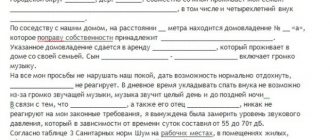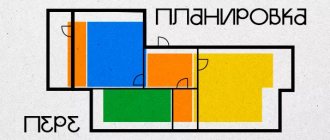Enforcement measures
For neighbors who behave immorally and do not allow others to live in peace, there are 4 types of responsibility: preventive, administrative, criminal and eviction from the house. The latter is used rarely and as a last resort.
The rights and obligations of a resident of an apartment building are prescribed in Articles 17 and 30 of the Housing Code of the Russian Federation. If these norms are violated, they may be subject to administrative liability, and if this does not work, then the eviction procedure may be initiated in court.
People can be forcibly evicted even when the housing is used for other purposes by tenants or owners. But, only by court decision.
How to solve a problem?
Litigation with neighbors is always a conflict. In any conflict situation, there are two ways out: solve the problem peacefully or go to court. The first option involves resolving the dispute at the pre-trial stage. You can try to talk with your neighbors, discuss those nuances that do not suit you. There is a chance that you will be heard and the violations will stop. You can also threaten your neighbors with calling the police if their actions are illegal.
You can immediately contact the owner of the apartment and inform him about the violations of the tenants. Since many tenants rent out housing without declaring the rental agreement to the tax office, they are interested in ensuring that the tenants’ stay is quiet and peaceful. After all, at any moment neighbors can not only inform the police, but also report to the tax service. A conversation with the owner in many cases helps significantly. The tenant can simply ask the tenants to vacate the territory.
The judicial procedure provides for neighbors to go to court. This procedure is more effective. But it has its own subtleties. A trial is a lengthy affair that takes not only time, money, but also nerves. It is not a problem to evict tenants through the court, since they do not have ownership rights to housing. The court can evict if the tenants have violated the law.
Who can initiate an eviction?
The following may file a claim in court for forced eviction:
- representatives of the management company;
- owners of neighboring apartments - you can file a claim with one person, or you can do it collectively;
- prosecutor.
Simply going to court to have noisy neighbors evicted will not work. First you need to go through the stage of preventive and administrative influence.
Sanctions for violations
Exceeding the noise threshold is the most common reason for neighbors to contact the police. A local police officer arrives at the address. But usually the case ends with a verbal reprimand to the offender. However, administrative legislation also contains more stringent sanctions, in addition to a reprimand, for these violations. In accordance with Art. 3.13 of the Code of Administrative Offenses, punishment is provided for:
- Carrying out repair work during prohibited hours;
- Violations of silence at night (from 11 p.m. to 7 a.m.).
Sanctions for these violations include a reprimand and payment of a fine. Fine amount:
- For citizens – 1000-3000 rubles;
- For officials – 4000-8000 rubles;
- For legal entities – 40,000 – 80,000 rubles.
The maximum that can be achieved in this situation is to force violators to pay a fine. But it will not be possible to evict them under such circumstances. The court is unlikely to take the applicant's side in this case.
Reasons
The grounds for eviction according to the law are the following:
- Use of the apartment for other purposes. We are talking about cases when a warehouse, grocery store, canteen, office or some kind of production is set up in a residential building
- Violation of the rules for operating the premises. Carrying out illegal redevelopment, creating an unsafe situation for other residents, refusing to carry out necessary repairs.
- Violation of the rights of other residents. For example, neighbors leading a riotous lifestyle prevent other residents from sleeping at night, create dangerous living conditions for them, and create conflict situations using physical force or even weapons.
You can't evict people just because they drink or take drugs. But, if such people create problems for others with their way of life, then measures can already be taken: write complaints to the Criminal Code, contact the local police officer, go to court to evict them.
Eviction of neighbors who interfere with life
To figure out how to evict neighbors who are disturbing your life, it is important to understand what actions are unlawful and violate the rights of other residents of the house. Any behavior of citizens that poses a threat to the life and health of others may become a reason for changing their place of registration.
Evicting neighbors for noise
The time when it is allowed to make noise is individual for each region of Russia. According to the noise law of 2021, silence is required in the capital from 23:00 to 8:00, and in St. Petersburg - from 22:00 to 8:00. On weekends and holidays this period is extended to 10:00 and 12:00 respectively.
In Izhevsk, the law on silence stipulates that neighbors are prohibited from making noise from 22:00 to 8:00 from Monday to Friday inclusive and from 23:00 to 9:00 on Saturday and Sunday.
In addition, according to the Law on Silence in Udmurtia, from one to three in the afternoon every day, it is not recommended to make noise in residential and non-residential premises of apartment buildings by using sound-reproducing devices and sound amplification devices, carrying out reconstruction, redevelopment, and repair work.
In accordance with Art. 5 of the Law of the Udmurt Republic dated October 13, 2011 No. 57-RZ “On establishing administrative liability for certain types of offenses” (as amended on November 20, 2019 No. 64-RZ), the guilty person is subject to administrative liability in the form of a fine:
- for citizens in the amount of 1000 to 2500 rubles;
- for officials - from 10,000 to 15,000 rubles;
- for legal entities - from 25,000 to 50,000 rubles.
Regarding noisy behavior:
- Party with disco.
- Dogs bark constantly.
- Rearrangement of furniture.
- Sports training involving noisy equipment (treadmill, dumbbells, etc.).
- Sharpening your musical skills.
- Singing in a group of several people during religious ceremonies.
- Use of noisy household appliances.
- Carrying out repairs using electrical tools.
- Quarrels, shouting, fights.
- Loud music, active conversations, sounds of technology (TV, speakers, etc.).
In case of emergency, it is legal to make noise at night. Exceptions include eliminating the consequences of natural disasters, extinguishing fires, and repairing wiring after a short circuit.
How to evict alcoholic neighbors
Drinking citizens and people who abuse narcotic and psychotropic substances not only make noise, but also endanger residents. In a stupefied state, drunks and drug addicts can start a fire, flood their neighbors, or steal someone's property when there is no money for a dose and alcohol.
To evict an alcoholic or drug addict, you will need to prove that the citizen regularly makes noise. To do this, it is recommended to constantly call the local police officer when drug addicts and alcoholics violate order. It is allowed to collect testimony from the remaining residents of the house. You can also agree to testify in court. Additionally, you should shoot video and make audio recordings confirming the inappropriate behavior of citizens.
How to kick a neighbor out of an apartment for constant fights
Constant fights are a direct violation of public order. When conflict situations arise, the police should be called. Law enforcement officials record antisocial behavior and take measures to eliminate it.
For unsanitary conditions
Unsanitary conditions include throwing garbage on the landing, a mess in the apartment, keeping a large number of pets, and using premises for storage of paints and varnishes. This behavior harms the health of other residents and provokes the appearance of cockroaches and rodents.
To record violations, you must contact the sanitary and epidemiological station and the police. Based on the complaint, an inspection is carried out (a month is allotted for it), after which the applicant receives a written response about the solution to the problem.
Inappropriate use of living space
If the activities of a person who works from home harm other residents, then according to the law he can be forcibly evicted. First, they contact the management company to confirm the violation. Next, the sanitary and epidemiological service is called, which determines the presence of threats to human life and health. Then witness statements are collected, after which a lawsuit is filed.
Eviction for unsanitary conditions
Breeding a large number of animals at home, clogging the stairwell are also reasons for eviction from the house, since this is a violation of SanPin standards and Federal Law No. 52.
First, you need to record the fact of the violation: take a photo, video, call the local police officer, representatives of the management company or HOA, or the sanitary and epidemiological station. No one will immediately evict anyone: first they will issue an order, draw up an administrative protocol, and if this does not work, then a lawsuit will be filed.
What are the dangers of neighbors who abuse alcohol?
If one of the people living in the same house has serious problems with drinking strong drinks, such a person poses a real threat to others.
He not only:
- Keeps you awake at night;
- Brings “incomprehensible” guests;
- Rowdy;
- Releases foul odors;
- Causes the proliferation of harmful insects
but it can also cause a fire or even an explosion:
- without putting out a cigarette butt or falling asleep with a cigarette;
- forgetting to turn off the stove.
It is very dangerous to be in the same building with such people.
At the same time, there are more than enough legal, albeit not always quick, ways to deal with neighbors leading an antisocial lifestyle.
How to evict your neighbors: where to go
Please note: according to Article 446 of the Code of Civil Procedure of the Russian Federation, you cannot evict a person if this is his only home. But, you can be forced to leave the apartment, sell it through an auction, and give the proceeds to the owner so that he can buy a new home in another place.
Eviction of tenants
The owner of the property will be responsible for them, so if anything happens, you must first contact the owner of the apartment to resolve the issue peacefully. If there is no desired result this way, then you can do the following:
- Find out whether the apartment is rented under contract or not. If not, then you can write a statement to the Federal Tax Service about illegal entrepreneurial activity.
- File a complaint with the management company or HOA, and at the same time submit an application to the local police officer.
- Apply to Rospotrebnadzor or the sanitary and epidemiological station, depending on the type of violation.
If the above actions do not give the desired result, which is rare, the owners of the residential premises of this building can go to court, but the statement of claim must be filed against the owner of the apartment, and not the tenants.
People who lived in an apartment under a social tenancy agreement are evicted in the same manner. But, in this case, the municipality will not be obliged to provide other housing, which means the tenant remains on the street.
Eviction of owners
The procedure will be the same, but the apartment will be sold at auction, and the proceeds, minus legal and enforcement costs, will be given to the former owner for disposal at his own discretion.
The order is:
- At the request of residents or the management company, an inspection is carried out.
- If everything is as stated, preventive work is carried out and an order is issued to eliminate the cause of the violations.
- If the administrative order is not fulfilled within the established time frame, then the responsible persons collect documents and transfer them to the district court at the location of the problem apartment.
- Whether the owner takes part in them or not is his business, but the decision will be made in absentia.
- The court decision comes into force after a month of its announcement.
Grounds and conditions for eviction of alcoholics, rowdy and noisy tenants
Unfortunately, many residents of apartment buildings are unlucky with neighbors living in the same building. This trend is especially relevant not so much to homeowners as to tenants who grossly violate the rules for the use of living space. In such cases, the current legislation of the Russian Federation provides for a number of reasons for their eviction .
- The most common reasons for forced eviction are, as a rule, the antisocial lifestyle of the people living in the apartment (alcoholics, including husbands who are drunkards, drug addicts, as well as those who organize brothels), causing damage to the public property of the residents of the entrance or specific neighbors (for example, flooding), repeated incidents of noise at inappropriate times - from 23:00 to 7:00 (how to evict a husband or wife, as well as cohabitants?).
- The use of an apartment for purposes other than residence may also be a reason for a citizen’s neighbors to contact law enforcement agencies.
The law prohibits the establishment of a retail outlet, office, warehouse, place of production, and so on on the territory of a residential apartment. Such activity can pose a danger to neighbors, as it causes an increased level of load on the home’s electrical network and can be a source of noise. Chemicals or explosive substances that threaten the life and health of other citizens living in the house should not be stored in a residential apartment. Otherwise, residents have the right to contact the sanitary control, which will carry out an inspection report on the suspect living space. The obtained materials can subsequently be used as evidence in court. - A third and no less weighty reason for eviction of neighbors from an apartment they rent or own may be careless handling of it.
This may include redevelopment carried out without obtaining permission and not coordinated with local authorities, housing and communication systems being in disrepair, which can cause dangerous situations and threaten other residents. A claim can be filed either at the initiative of the homeowner or by neighbors, depending on the nature of the violation.
If a preliminary conversation with unscrupulous neighbors or tenants has no effect and the violations have not stopped or been eliminated, tenants have every right to go to court based on the proven presence of at least one of the above grounds. Such requests must be recorded in writing and officially .
Who cannot be evicted
The following categories of citizens may never be evicted under any circumstances:
- Minor children or incompetent citizens. These persons are under the protection of the guardianship and trusteeship authorities, which, in turn, will never give permission for eviction.
- Poor citizens. People who have severe financial difficulties cannot afford to pay for rented housing, much less have the opportunity to buy residential premises, that is, if such citizens are evicted, they will a priori remain on the street.
- Old-age pensioners, disabled people of the first and second groups, WWII veterans.
- Orphans. If eviction is inevitable (in the case of resettlement of a residential building due to its demolition, etc.), the orphan must be provided with alternative living quarters with living conditions that are not inferior to the previous ones.
Who can evict
Every citizen living in an apartment building has rights and responsibilities. Responsibilities are to comply with the rules of cohabitation without disturbing the peace of other citizens.
The rights of citizens include:
- right to silence;
- protection of living space from destruction or damage;
- protection of life and health, including from attacks.
If rights are violated by other residents, you should contact the appropriate authorities or court. The second party that can begin the eviction procedure is representatives of the municipality - in the case when the apartment is on the balance sheet of city or government organizations.
Procedure
Initiating this process when housing is privatized is somewhat more difficult. To do this, a number of conditions must be met.
This includes the following sequential actions.
1 step. Warning
Here you need to try to solve the problem peacefully through negotiations and requests. At the initial stage, you can talk to the person in a good way, explaining in accessible language.
It doesn’t help to talk in a harsher manner, threatening to go to the police. And finally, issue the “last Chinese warning.”
Step 2. Public outcry and censure
It would be correct to coordinate and discuss the unfavorable situation with other neighbors, involving them in this process so that they become witnesses to what is happening. Whenever an incident occurs, you should immediately notify them about it.
It’s a good idea to hold a meeting on your initiative where everything can be explained. It is even better to invite the culprit to this meeting. This will add arguments to the judges.
Step 3. Proof
Carry out a detailed collection of evidence of the citizen’s actions violating the rights of other residents.
To do this, we recommend inviting police officers in case of violation of law and order, calling representatives of the sanitary and epidemiological station in case of improper or ownerless maintenance of housing.
If minor children live with disadvantaged neighbors, call the guardianship authorities.
Contact the government administration to the department responsible for the redevelopment of buildings and apartments in order to record illegal repair work that led to changes in housing.
Recording of all violations using audio and video recording of witness testimony. Only in combination, these conditions can give a positive result. The more evidence is collected and the more other residents of the house are involved, the higher the chances of success.
Step 4. Go to court
When the patience of the residents is over, they should go to court to begin the actions provided for by the Housing Code of the Russian Federation. Provided that the residential premises are rented, the plaintiff may be the owner of the property.
You need to draw up a statement of claim and send it to the court, this can be done in person, or sent by mail, registered mail with notification.
For a positive consideration of the case, a list of the following documents should be attached to the statement of claim::
- USRN extract for the apartment;
- collective appeal of the residents of the house;
- evidence - protocols of the Ministry of Internal Affairs, acts of the sanitary-epidemiological station, conclusions of the administration, photo and video evidence;
- written requests from residents to troublemakers to stop disturbing the peace or to eliminate the fact of improper maintenance of the apartment, floods.
This package of documents is enough to start the process. Most often, the court takes the side of the plaintiff, provided that the evidence base is collected in full and contains all the necessary grounds.
Statement of claim
The most important document on which the court will rely is the statement of claim. It is very important to compose it correctly. It should contain the following:
- The court where the claim is filed. Many refusals come due to an error in this particular paragraph, since it is necessary to decide which court has jurisdiction to hear this claim.
- Full name of the plaintiff, address, contact information.
- Full name of the defendant, address, contact information.
- The essence of the dispute. Here it is necessary to describe in detail what the violation consists of, when it occurred, and who committed it.
- Requirements. It is necessary to indicate what the plaintiff wants to receive during the trial.
- An appendix that includes all other documents relevant to the case, such as evidence.
- Date of filing the claim and signature of the plaintiff.
Sample application for download. ⇐
Sample application to the district police officer regarding illegal residents
It can be downloaded from the following link. ⇐
Sample application to a district police officer to evict tenants
You will not be able to find such a sample on the Internet. This is because the district police officer can only help evict those living illegally, since they have no rights to the housing where they are located. In the case of tenants, this will not work, because they have the right to housing based on the rental agreement. Only the owner himself or the court can help here.
If the lease agreement has expired, or citizens live in your living space without any agreement, they will help you fill out a statement directly at the police station.
Terms and cost, state duty
According to the Civil Procedure Code of the Russian Federation, namely paragraph 1 of Article 154, dispute resolution lasts no more than 2 months from the date the statement of claim is received in court. The state duty is 300 rubles for individuals and 6,000 rubles for legal entities. This is enshrined in subparagraph 3 of paragraph 1 of Article 333.19 of the Tax Code of the Russian Federation.
Writ of execution for forced eviction
After the completion of the court hearing, the court, or the plaintiff himself, sends to the Federal Bailiff Service a writ of execution for forced eviction, where it is handed over to the bailiff who will implement the decision of the court. After handing over the sheet, all its data will be entered into the FSSP database.
The process itself may take several months, given that the defendant will try to protest (appeal) the decision of the judicial authority. Provided that the living space was purchased with a mortgage loan, the period can take up to 6 (six) months.
FSSP eviction procedure
It became known that the defendant’s appeal was rejected and the decision was upheld - the bailiff initiates enforcement proceedings under Art. 30 of Federal Law No. 229. After which he notifies the debtor of the need to vacate the apartment within 10 (ten) days based on the court decision.
The person did not comply with the bailiff’s request - then the home is forcibly vacated, including with the assistance of police officers. In such a situation, the bailiff is obliged to draw up an eviction act, which will indicate all the circumstances, the participants in the procedure, and make an inventory of the property. Transportation of property is carried out at the expense of the bailiff service.
If a person did not want to leave the home voluntarily, but forcibly, then enforcement costs (fee) in the amount of up to 7% of the damage caused to the premises are imposed on him.










